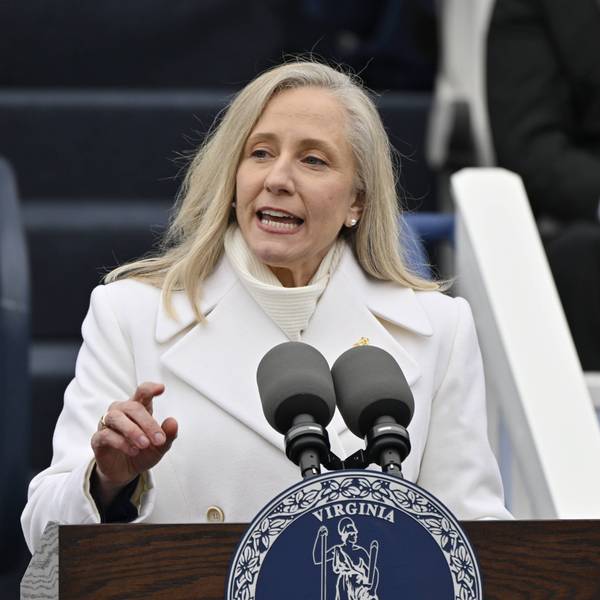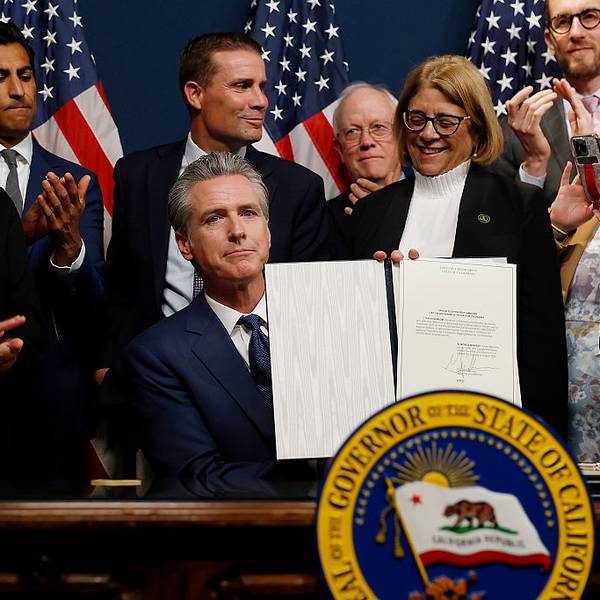Democracy Wins as 'Biggest Gerrymandering Case in Generation' Moves Forward
'Gerrymandering pits political power against the people, regardless of which party holds power'
On Wednesday, a panel of federal judges advanced what an expert says could be "the biggest gerrymandering case in a generation." This case could have nationwide implications for elections and democracy across the United States.
The three-judge court ruled 2-1 (pdf) that the First Amendment-based claim against partisan gerrymandering in Maryland's sixth congressional district is valid and may proceed to summary judgment or trial. The ruling has no bearing on voting this November, and a decision would apply only to future elections.
"Today's decision is another victory for voters and their right to choose their legislators rather than allowing legislators to choose their voters."
--Karen Hobart Flynn, Common Cause
The case, brought by American University law student Steve Shapiro, argues that Maryland's congressional district map, drawn by Democratic lawmakers following the 2010 Census, violated the rights of 6th District Republican voters to political association and expression.
But as the case has the potential to set a national precedent restricting partisan gerrymandering, it moving forward is "excellent news for both Democrats and democracy because of how widespread Republican gerrymandering is nationwide," Daily Kos contributing editor Stephen Wolf wrote Wednesday.
Indeed, the Washington Post reported:
Michael Kimberly, Shapiro's attorney, said that if his client prevails at trial, and the case ends up back in the Supreme Court, it could eventually bring sweeping changes to redistricting across the country.
"This could be the biggest gerrymandering case in a generation," Kimberly said. "It could have enormous impact."
As North Carolina's News & Observer wrote earlier this month:
Opinions by U.S. Supreme Court justices, Ruth Bader Ginsburg and Anthony Kennedy in particular, have suggested that they believe partisan gerrymandering is a problem, [Common Cause North Carolina executive director Bob] Phillips said.
"Partisanship might be the next frontier for redistricting cases," said Wendy Underhill, director of the Elections and Redistricting Program for the National Conference of State Legislatures.
Of the prospect of a Supreme Court decision in the Maryland case, Wolf wrote: "Such a ruling could have enormous effects since 55 percent of congressional districts are currently drawn to favor Republicans while just 10 percent were designed for Democrats--particularly when the current partisan and institutional balance of power significantly constrains anti-gerrymandering efforts at the legislative level."
Karen Hobart Flynn, president of the pro-democracy group Common Cause, wrote an op-ed earlier this month stating that "gerrymandering pits political power against the people, regardless of which party holds power."
On Wednesday, in response to the judge's ruling, Hobart Flynn added: "Today's decision is another victory for voters and their right to choose their legislators rather than allowing legislators to choose their voters. Partisan gerrymanders strip citizens of the ability to elect the candidates of their choice, and that is why Common Cause is fighting this gerrymander by Democrats in Maryland and why we have brought suit challenging a blatant partisan gerrymander perpetrated by Republicans in North Carolina."
Common Cause brought the North Carolina lawsuit in early August. It argues that the legislature's gerrymandering clearly violates the Equal Protection Clause of the 14th Amendment.
An Urgent Message From Our Co-Founder
Dear Common Dreams reader, The U.S. is on a fast track to authoritarianism like nothing I've ever seen. Meanwhile, corporate news outlets are utterly capitulating to Trump, twisting their coverage to avoid drawing his ire while lining up to stuff cash in his pockets. That's why I believe that Common Dreams is doing the best and most consequential reporting that we've ever done. Our small but mighty team is a progressive reporting powerhouse, covering the news every day that the corporate media never will. Our mission has always been simple: To inform. To inspire. And to ignite change for the common good. Now here's the key piece that I want all our readers to understand: None of this would be possible without your financial support. That's not just some fundraising cliche. It's the absolute and literal truth. We don't accept corporate advertising and never will. We don't have a paywall because we don't think people should be blocked from critical news based on their ability to pay. Everything we do is funded by the donations of readers like you. Will you donate now to help power the nonprofit, independent reporting of Common Dreams? Thank you for being a vital member of our community. Together, we can keep independent journalism alive when it’s needed most. - Craig Brown, Co-founder |
On Wednesday, a panel of federal judges advanced what an expert says could be "the biggest gerrymandering case in a generation." This case could have nationwide implications for elections and democracy across the United States.
The three-judge court ruled 2-1 (pdf) that the First Amendment-based claim against partisan gerrymandering in Maryland's sixth congressional district is valid and may proceed to summary judgment or trial. The ruling has no bearing on voting this November, and a decision would apply only to future elections.
"Today's decision is another victory for voters and their right to choose their legislators rather than allowing legislators to choose their voters."
--Karen Hobart Flynn, Common Cause
The case, brought by American University law student Steve Shapiro, argues that Maryland's congressional district map, drawn by Democratic lawmakers following the 2010 Census, violated the rights of 6th District Republican voters to political association and expression.
But as the case has the potential to set a national precedent restricting partisan gerrymandering, it moving forward is "excellent news for both Democrats and democracy because of how widespread Republican gerrymandering is nationwide," Daily Kos contributing editor Stephen Wolf wrote Wednesday.
Indeed, the Washington Post reported:
Michael Kimberly, Shapiro's attorney, said that if his client prevails at trial, and the case ends up back in the Supreme Court, it could eventually bring sweeping changes to redistricting across the country.
"This could be the biggest gerrymandering case in a generation," Kimberly said. "It could have enormous impact."
As North Carolina's News & Observer wrote earlier this month:
Opinions by U.S. Supreme Court justices, Ruth Bader Ginsburg and Anthony Kennedy in particular, have suggested that they believe partisan gerrymandering is a problem, [Common Cause North Carolina executive director Bob] Phillips said.
"Partisanship might be the next frontier for redistricting cases," said Wendy Underhill, director of the Elections and Redistricting Program for the National Conference of State Legislatures.
Of the prospect of a Supreme Court decision in the Maryland case, Wolf wrote: "Such a ruling could have enormous effects since 55 percent of congressional districts are currently drawn to favor Republicans while just 10 percent were designed for Democrats--particularly when the current partisan and institutional balance of power significantly constrains anti-gerrymandering efforts at the legislative level."
Karen Hobart Flynn, president of the pro-democracy group Common Cause, wrote an op-ed earlier this month stating that "gerrymandering pits political power against the people, regardless of which party holds power."
On Wednesday, in response to the judge's ruling, Hobart Flynn added: "Today's decision is another victory for voters and their right to choose their legislators rather than allowing legislators to choose their voters. Partisan gerrymanders strip citizens of the ability to elect the candidates of their choice, and that is why Common Cause is fighting this gerrymander by Democrats in Maryland and why we have brought suit challenging a blatant partisan gerrymander perpetrated by Republicans in North Carolina."
Common Cause brought the North Carolina lawsuit in early August. It argues that the legislature's gerrymandering clearly violates the Equal Protection Clause of the 14th Amendment.
On Wednesday, a panel of federal judges advanced what an expert says could be "the biggest gerrymandering case in a generation." This case could have nationwide implications for elections and democracy across the United States.
The three-judge court ruled 2-1 (pdf) that the First Amendment-based claim against partisan gerrymandering in Maryland's sixth congressional district is valid and may proceed to summary judgment or trial. The ruling has no bearing on voting this November, and a decision would apply only to future elections.
"Today's decision is another victory for voters and their right to choose their legislators rather than allowing legislators to choose their voters."
--Karen Hobart Flynn, Common Cause
The case, brought by American University law student Steve Shapiro, argues that Maryland's congressional district map, drawn by Democratic lawmakers following the 2010 Census, violated the rights of 6th District Republican voters to political association and expression.
But as the case has the potential to set a national precedent restricting partisan gerrymandering, it moving forward is "excellent news for both Democrats and democracy because of how widespread Republican gerrymandering is nationwide," Daily Kos contributing editor Stephen Wolf wrote Wednesday.
Indeed, the Washington Post reported:
Michael Kimberly, Shapiro's attorney, said that if his client prevails at trial, and the case ends up back in the Supreme Court, it could eventually bring sweeping changes to redistricting across the country.
"This could be the biggest gerrymandering case in a generation," Kimberly said. "It could have enormous impact."
As North Carolina's News & Observer wrote earlier this month:
Opinions by U.S. Supreme Court justices, Ruth Bader Ginsburg and Anthony Kennedy in particular, have suggested that they believe partisan gerrymandering is a problem, [Common Cause North Carolina executive director Bob] Phillips said.
"Partisanship might be the next frontier for redistricting cases," said Wendy Underhill, director of the Elections and Redistricting Program for the National Conference of State Legislatures.
Of the prospect of a Supreme Court decision in the Maryland case, Wolf wrote: "Such a ruling could have enormous effects since 55 percent of congressional districts are currently drawn to favor Republicans while just 10 percent were designed for Democrats--particularly when the current partisan and institutional balance of power significantly constrains anti-gerrymandering efforts at the legislative level."
Karen Hobart Flynn, president of the pro-democracy group Common Cause, wrote an op-ed earlier this month stating that "gerrymandering pits political power against the people, regardless of which party holds power."
On Wednesday, in response to the judge's ruling, Hobart Flynn added: "Today's decision is another victory for voters and their right to choose their legislators rather than allowing legislators to choose their voters. Partisan gerrymanders strip citizens of the ability to elect the candidates of their choice, and that is why Common Cause is fighting this gerrymander by Democrats in Maryland and why we have brought suit challenging a blatant partisan gerrymander perpetrated by Republicans in North Carolina."
Common Cause brought the North Carolina lawsuit in early August. It argues that the legislature's gerrymandering clearly violates the Equal Protection Clause of the 14th Amendment.

